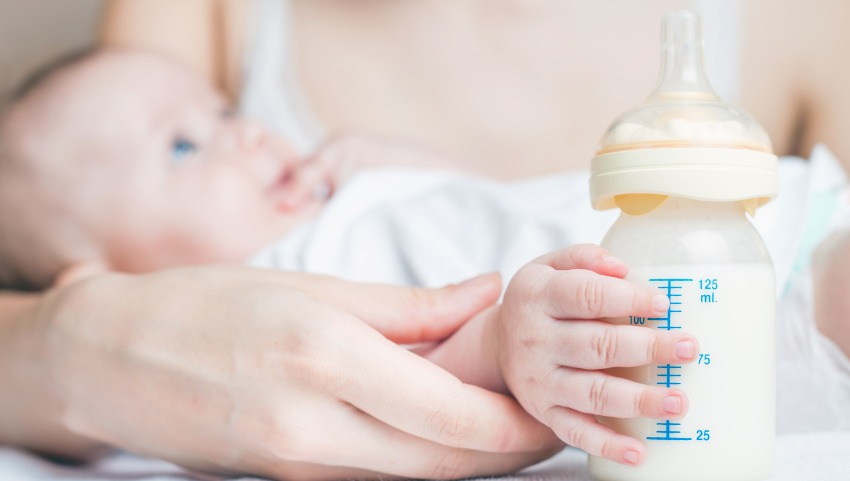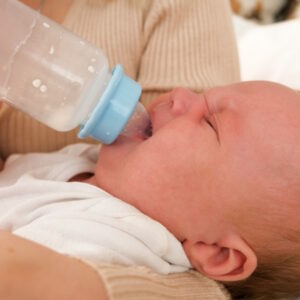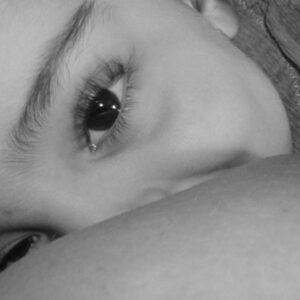How does breast milk donation work? Can I donate? Or receive donated breast milk for my baby? And what are breast milk banks?
Let’s go through the topic of donating breast milk and its risks and benefits.
Breast Milk Donation and Breast Milk Banks – What You Need to Know
What is Breast Milk Donation?
Many of us have donated blood to a blood bank or know someone who has. An altruistic act of donating something as personal and valuable as your own blood to someone else to give them a chance to heal or live better.
Only a few of us, however, know someone who has donated her human milk to a breast milk bank. Actually, this is not only due to the fact that only a tiny fraction of the population are potential donors (if you are a lactating woman, you’re one of them!) but also to the fact that many of the potential donors are not even aware that breast milk banks exist nor of what they do. And that’s a real pity.
Not only does donating breast milk help many babies, but promoting milk banking also contributes to raising awareness among friends, family, and society in general about the value of breastfeeding and the uniqueness of human milk.
What are breast milk banks?
Breast milk banks are organizations that collect, process, and distribute breast milk obtained from carefully selected donors. The milk is distributed to hospitals in nearby areas or even within the same country for the nutrition of babies that are particularly fragile and whose mothers cannot supply them with (enough of) their own milk.
Is there a milk bank in my country?
Very probably, yes. Milk banks exist now in each continent of the world. Brazil happens to be the country with the largest and probably oldest network of breast milk banks worldwide. Brazil has managed to build a network that is fully recognized by and integrated with the public health system of the country. A great achievement that some other countries, unfortunately, can only dream of.
As of today, there are around 280 active human milk banks in Europe, and 17 more to come. Some of them are part of regional blood or tissue banks, while the vast majority are located in Neonatal Intensive Care Units (NICUs) within hospitals.
Human Milk Banking Association of North America currently has 31 member organizations in the US and Canada.
To find a breast milk bank near your location, simply search for “breast milk bank” + your city name. You can, of course, also ask your health nurse or midwife.
Can all babies receive donor milk?
The recipients of the milk are normally premature and low or very low birth weight babies whose health is especially vulnerable. Feeding these neonates with donor milk instead of infant formula has been proven to decrease the development of dangerous conditions such as necrotizing enterocolitis (where the intestinal tract is damaged and eventually destroyed).
Other potential recipients are babies with malabsorption syndromes, renal failures, or those who need special pre- or post-operative nutrition, to name just a few.
I am a lactating mom. Can I become a donor?
It would be great to give a clear “yes” as an answer; the more milk collected to serve babies, the better! However, donors need to be carefully selected to have the maximum guarantee that the breast milk obtained is of the best possible quality. That’s why there are certain eligibility criteria, and not all women who could potentially donate are, in the end, allowed to do it.
For instance, women who smoke, consume more than a certain amount of alcohol per day, take drugs, or those who recently received a blood transfusion or suffered from certain infectious diseases will not be eligible for donation. In addition, women willing to donate will undergo a serological screening on HIV, hepatitis B and C, HTLV, and syphilis.
I would like to donate; what will they do with my milk?
Are you becoming enthusiastic about the idea of helping other babies and families but still feeling a bit insecure about what exactly is going to happen to your milk?
Completely normal!
Since each particular milk bank functions slightly differently, the best way to find out the specific procedures used is by contacting the bank closest to you. But below, we list the most common steps that will be followed so that you already have a good idea of what you can expect:
- You will first need to pass the screening procedure. Once you’re in, the breast milk bank staff will teach you how to pump, store, and transport your milk properly. Of note, some banks have a transport service that can pick up your milk at home on a regular basis.
- When your milk is in the hands of the bank, they will check that it has the expected physical appearance (e.g., no visible contamination, no changes in color), and they will do a microbiological test.
- If the milk passes this first check, it will then be pasteurized in order to inactivate eventual viruses and bacteria. During pasteurization, your milk will be heated in a water bath under controlled conditions to make it microbiologically safer. Norway is an exception in that it does not pasteurize milk; instead, they apply stringent screening measures, perfectly traces milk from donor to consumer, and repeats the tests in donors frequently. Moreover, the country has really low rates of HIV and hepatitis.
- Once your milk has been pasteurized, it will be ready to be stored in the fridge (to be used right away) or freezer (long-term storage) until it is given to a baby in need.
- When a baby is eligible to be fed with donor milk, and a parent or guardian has given informed consent, a written medical prescription will be issued by the healthcare provider. The milk bank will then dispense the milk as required.
You can watch a short video of the process for donated milk here. I find it heart-warming and fascinating.
Will I get paid for the milk I donate?
Most breast milk banks are non-profit organizations, and they will not pay the donors. As such, they have a mission and invest their profits into what is needed to fulfill their mission. They consider breast milk donation as a voluntary and altruistic act from generous women who simply want to help others.
There has been (and there still is) quite some debate on whether moms should be paid or not to recognize the time and effort that goes into pumping milk. There are, in fact, some for-profit banks that do pay nursing moms for their donations, but they raise quite some ethical issues.
While paying moms probably helps to increase the amount of milk received at the banks, experience, and research suggest that it may introduce risks for donors, donors’ own babies, and the receiving babies. Imagine a situation where a donor would feel pressure to make money by selling her milk, and hence cut down the breastfeeding of her own child or adulterate her milk by, for instance, adding cow’s milk into it to increase the volume.
How Can I get donated breast milk for my baby?
Receiving donated breast milk for your child may be more difficult than becoming a donor. Donated milk will, in most places, mainly be provided to hospitalized babies.
However, if your baby does have a need for donated milk, one possible way forward is to contact your healthcare provider for a prescription. The possibilities and processes will vary between countries.
Some examples of reasons why your baby may be prescribed outpatient donor milk include being preterm, failure to thrive, allergy to cow’s milk and soy milk, Crohn’s disease, some infectious diseases, and healing from surgery. Donor milk may also prescribed due to maternal health complications, multiple births, or adoption.
Please note these are just examples, and you need to contact your hospital or healthcare provider to discuss your particular situation.
What are the benefits of breast milk donations?
The obvious benefit is that premature and vulnerable babies can get access to breastmilk instead of or as a supplement to formula. Due to the many benefits of breast milk, this is particularly valuable for these babies. For the particular benefits for these babies, read above under the heading “Can all babies receive donor milk?”
What are the risks of breast milk donations?
The main risks surrounding breast milk donations relate to informal breast milk sharing or donations, i.e., when no proper breast milk bank is involved and certifies the quality of the milk.
Since breast milk is a body fluid, it can be contaminated by bacteria, viruses, drugs, etc., or diluted, as described above, and that’s why organized, formal donations are so important.
In some places, it is popular to buy and sell breast milk over the Internet. This is a high-risk situation for the buyer. A study in 2013 investigating the occurrence of bacteria in breast milk samples bought this way concluded:
“Human milk purchased via the Internet exhibited high overall bacterial growth and frequent contamination with pathogenic bacteria, reflecting poor collection, storage, or shipping practices. Infants consuming this milk are at risk for negative outcomes, particularly if born preterm or are medically compromised.”
I think the best recommendation here is: Neither sell, share, nor buy breast milk informally!
Other than that, the main risks are probably related to paid donations and babies that, therefore, may not receive their mom’s milk to the extent they need – if the mom sells her milk to make money.
Can moms still donate their milk during the pandemic?
In general, yes. That being said, the pandemic is an evolving situation, and new knowledge emerges every day regarding the disease, the virus, and the transmission routes.
Both the European Milk Bank Association (EMBA) and The Human Milk Banking Association of North America (HMBANA) state that it is not yet known whether the virus (SARS CoV-2) can be found in human milk, and if found, if it could be contagious. However, other coronaviruses are destroyed by pasteurization.
Human milk banks are advised to closely monitor any developments regarding COVID-19 and how it relates to milk banking and apply specific protocols to guarantee the safety of donors and babies. It is best to check with your milk bank on the most updated information and safety measures, as they may change day by day.
Takeaway
I hope this article clarifies the topics of breast milk donation and breast milk banks for you. Donating breast milk is a fantastic way to help babies that, e.g. had a rough start due to being born premature or being ill.
Even though it can be tempting to sell or buy breast milk, it is NOT recommended due to all the risks for the baby. Instead, contact a non-profit milk bank to donate milk or your healthcare provider to investigate if your baby can be prescribed donated milk.
Good luck!
Read Next About Breastfeeding
- The Magic Components Of Breast Milk and How They Benefit Your Baby
- Considering Adoptive Breastfeeding? Benefits and How-to!
- Herbs to Increase Milk Supply (or Decrease it) Safely
References
- Breast milk donation in Brazil
- The European Milk Bank Association Map
- Formula versus donor breast milk for feeding preterm or low birth weight infants (2019)
- Prescribing Donor Milk
- COVID-19: EMBA Position Statement
- Milk Banking and COVID-19
- Microbial Contamination of Human Milk Purchased Via the Internet
- Prescribing Donor Milk

Paula Dennholt founded Easy Baby Life in 2006 and has been a passionate parenting and pregnancy writer since then. Her parenting approach and writing are based on studies in cognitive-behavioral models and therapy for children and her experience as a mother and stepmother. Life as a parent has convinced her of how crucial it is to put relationships before rules. She strongly believes in positive parenting and a science-based approach.
Paula cooperates with a team of pediatricians who assist in reviewing and writing articles.







